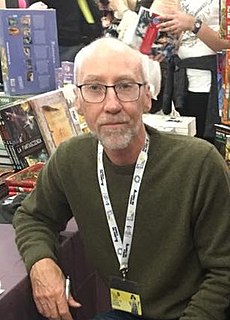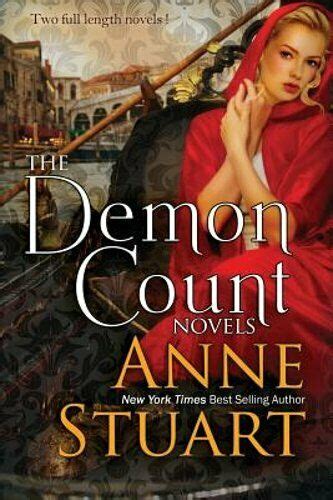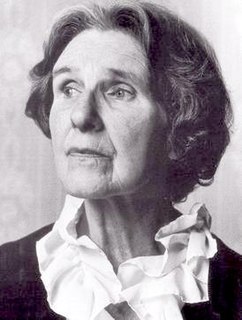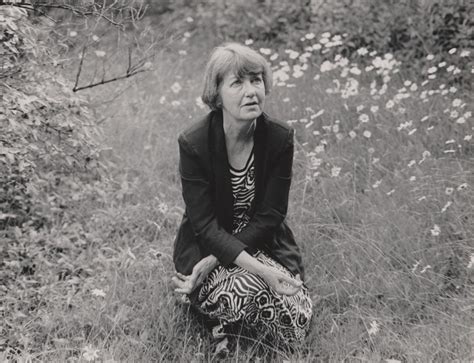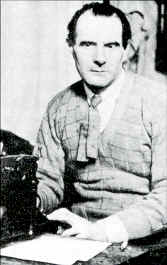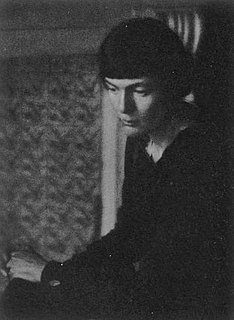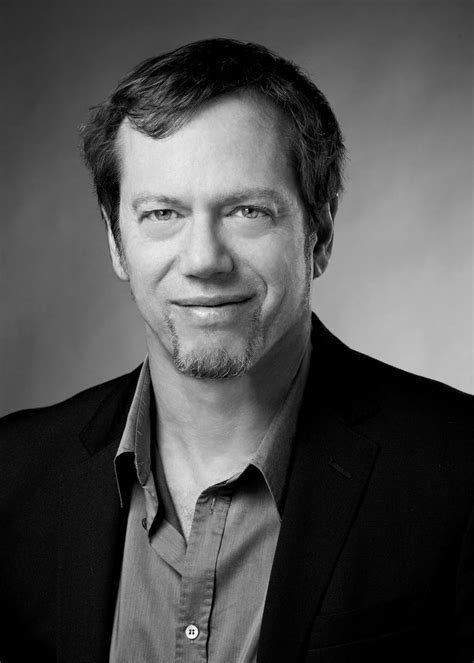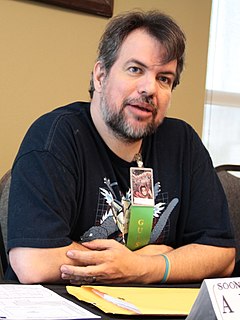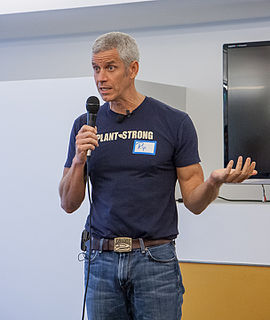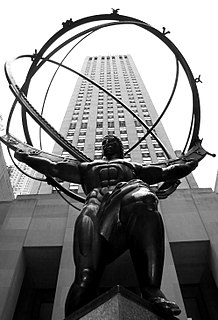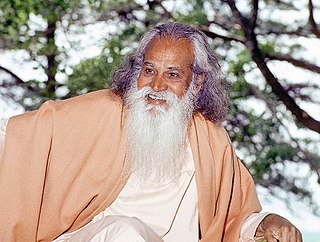Top 382 Plague Quotes & Sayings - Page 6
Explore popular Plague quotes.
Last updated on April 19, 2025.
Without memories, without hope, they lived for the moment only. indeed, the here and now had come to mean everything to them. For there is no denying that the plague had gradually killed off in all of us the faculty not of love only but even of friendship. Naturally enough, since love asks something of the future, and nothing was left us but a series of present moments.
More than one philosopher has claimed that we ever remain children, far beneath the indurated layers that make up the armour of adulthood. Armour encumbers, restricts the body and soul within it. But it also protects. Blows are blunted. Feelings lose their edge, leaving us to suffer naught but a plague of bruises, and, after a time, bruises fade.
We need more than individual value systems; we need a shared vision. A nation is held together by shared values, shared beliefs, shared attitudes. That is what enables a people to maintain a cohesive society despite the tensions of daily life. That is what enables them to rise above the conflicts that plague any society.
The education bestowed on Flora Poste by her parents had been expensive, athletic and prolonged; and when they died within a few weeks of one another during the annual epidemic of the influenza or Spanish Plague which occurred in her twentieth year, she was discovered to possess every art and grace save that of earning her own living.
The war for our Union, with all the constitutional issues which it settled, and all the military lessons which it gathered in, has throughout its dilatory length but one meaning in the eyes of history. It freed the country from the social plague which until then had made political development impossible in the United States. More and more, as the years pass, does the meaning stand forth as the sole meaning.
A southwest blow on ye and blister you all o'er!' 'The red plague rid you!' 'Toads, beetles, bats, light on you!' 'As wicked dew as e'er my mother brushed with raven's feather from unwholesome fen drop on you.' 'Strange stuff' 'Thou jesting monkey thou' 'Apes with foreheads villainous low' 'Pied ninny' 'Blind mole...' -The Caliban Curses
America has been a land of dreams. A land where the aspirations of people from countries cluttered with rich, cumbersome, aristocratic, ideological pasts can reach for what once seemed unattainable. Here they have tried to make dreams come true. Yet now... we are threatened by a new and particularly American menace. It is not the menace of class war, of ideology, of poverty, of disease, of illiteracy, or demagoguery, or of tyranny, though these now plague most of the world. It is the menace of unreality.
Islamist-jihadist terrorism-a plague that has spread to almost every corner of the world-creates painful dilemmas for the peoples and decision makers who confront it. Its rapid, shape-shifting advance has sometimes confounded efforts to comprehend its origins, motives, and aims. Its sophistication in exploiting liberal values poses challenges and difficulties for the Western world, and for liberal democratic states in general, in attaining effective and balanced counter-terrorism policies.
Every country must have its own devil. Welshland its own, and France its own. Our German devil will be a good wind-pipe, and must be called drinking, being so thirsty and hell-like that no guzzling of wine and beer, however large, will cool it off, and I fear that such will ever remain Germany's plague, until the day of judgment.
And yet our distress comes from no failure of substance. We are stricken by no plague of locusts. Compared with the perils which our forefathers conquered, because they believed and were not afraid, we have still much to be thankful for. Nature still offers her bounty and human efforts have multiplied it. Plenty is at our doorstep, but a generous use of it languishes in the very sight of the supply.
Avoid stock expressions (like the plague, as William Safire used to say) and repetitions. Don't say that as a boy your grandmother used to read to you, unless at that stage of her life she really was a boy, in which case you have probably thrown away a better intro. If something is worth hearing or listening to, it's very probably worth reading. So, this above all: Find your own voice.
A hero is also someone who, in their day to day interactions with the world, despite all the pain, uncertainty and doubt that can plague us, is resiliently and unashamedly themselves. If you can wake up every day and be emotionally open and honest regardless of what you get back from the world then you can be the hero of your own story. Each and every person who can say that despite life’s various buffetings that they are proud to be the person they are is a hero.
Depression is about anger, it's about anxiety, it's about character and heredity. But it is also about something that is in its way quite unique. It is the illness of identity, it is the illness of those who do not know where they fit, who lose faith in the myths they have so painstakingly created for themselves. It is a plague - especially if you add in its various forms of expression, like alcoholism, anorexia, bulimia, drug addiction, compulsive behavior of one kind or another. They're all the same things: attempts to avoid disappearance, or nothingness, or chaos.
What so pure, which envious tongues will spare?
Some wicked wits have libell'd all the fair,
With matchless impudence they style a wife,
The dear-bought curse, and lawful plague of life;
A bosom serpent, a domestic evil,
A night invasion, and a mid-day devil;
Let not the wise these sland'rous words regard,
But curse the bones of ev'ry living bard.
For the last 250 years or so, secularists have waited patiently for the fulfilment of their prediction that religion would die out in the next generation or two. But religious people have been singularly uncooperative, and new strategies have developed for controlling this blight on human progress. If religion won't "wither away" as philosopher Richard Rorty has wished, then perhaps it can be privatized and thereby removed from influence on public life‚ - sort of like localizing an outbreak of the plague.
The effort to improve the conditions of man, however, is not a task for the few. It is the task of all nations-acting alone, acting in groups, acting in the United Nations, for plague and pestilence, plunder and pollution, the hazards of nature and the hunger of children are the foes of every nation. The earth, the sea and the air are the concern of every nation. And science, technology and education can be the ally of every nation.
The essential is never to arrive anywhere, never to be anywhere. The essential is to go on squirming forever at the edge of the line, as long as there are waters and banks and ravening in heaven a sporting God to plague his creature, per pro his chosen shits. I've swallowed three hooks and am still hungry. Hence the howls. What a joy to know where one is, and where one will stay, without being there. Nothing to do but strech out comfortably on the rack, in the blissful knowledge you are nobody for eternity.
Human beings are so destructive. I sometimes think we're a kind of plague, that will scrub the earth clean. We destroy things so well that I sometimes think, maybe that's our function. Maybe every few eons, some animal comes along that kills off the rest of the world, clears the decks, and lets evolution proceed to its next phase.
Ring around the rosie. A pocket full of posie. Ashes ashes, we all fall down. Some people say that this poem is about the Black Death, the fourteenth-century plague that killed 100-million people... Sadly, though, most experts think this is nonsense... How can I be so sure about this rhyme when all the experts disagree? Because I ate the kid who made it up.
The divide of race has been America's constant curse. Each new wave of immigrants gives new targets to old prejudices. Prejudice and contempt, cloaked in the pretense of religious or political conviction, are no different. They have nearly destroyed us in the past. They plague us still. They fuel the fanaticism of terror. They torment the lives of millions in fractured nations around the world. These obsessions cripple both those who are hated and, of course, those who hate, robbing both of what they might become.
We know about as much about software quality problems as they knew about the Black Plague in the 1600s. We've seen the victims' agonies and helped burn the corpses. We don't know what causes it; we don't really know if there is only one disease. We just suffer - and keep pouring our sewage into our water supply.
We are not, of course, optimistic about our chances of success. Some form of ecocatastrophe, if not thermonuclear war, seems almost certain to overtake us before the end of the century. (The inability to forecast exactly which one - whether plague, famine, the poisoning of the oceans, drastic climatic change, or some disaster entirely unforeseen - is hardly grounds for complacency.)
The Bible says, Be anxious for nothing, and that is a commandment! I took up a battle in this area, fought my way through and avoided having to be anxious! You can agonize over something for ages and plague yourself and those around you. It's much better to fight your way through as soon as it comes up.
If you were to go, and hopefully someday you will, you would see a lot of paintings of dead people. You'd see Jesus on the cross, and you'd see a dude get stabbed in the neck, and you'd see people dying at sea and in battle and a parade of martyrs. But Not. One. Single. Cancer. Kid. Nobody biting it from the plague or smallpox or yellow fever or whatever, because there is no glory in illness. There is no meaning to it. There is no honor in dying of.
I want to celebrate these elms which have been spared by the plague, these survivors of a once flourishing tribe commemorated by all the Elm Streets in America. But to celebrate them is to be silent about the people who sit and sleep underneath them, the homeless poor who are hauled away by the city like trash, except it has no place to dump them. To speak of one thing is to suppress another.
We live in a time which has created the art of the absurd. It is our art. It contains happenings, Pop art, camp, a theater of the absurd... Do we have the art because the absurd is the patina of waste...? Or are we face to face with a desperate or most rational effort from the deepest resources of the unconscious of us all to rescue civilization from the pit and plague of its bedding?
I used to be jealous; I'm not jealous anymore. And a miracle happened to me, because if you're jealous, it's a cancer, it's a plague on your spirit, it really is. And I actually cured jealousy in a very weird way - I cured it with mathematics. And I'm not a math person at all, but I've been with my wife for about seven years, so we have had sex probably, I'd like to think, like, 9 million times or, at least, 1,500. So, the way I figured it, if she goes out and screws some other guy once - I'm still winning.
Disease an never be conquered, can never be quelled by emotion's willful screaming or faith's symbolic prayer. It can only be conquered by the energy of humanity and the cunning in the mind of man. In the patience of a Curie, in the enlightenment of a Faraday, a Rutherford, a Pasteur, a Nightingale, and all other apostles of light and cleanliness, rather than of a woebegone godliness, we shall find final deliverance from plague, pestilence, and famine.
Auschwitz is outside of us, but it is all around us, in the air. The plague has died away, but the infection still lingers and it would be foolish to deny it. Rejection of human solidarity, obtuse and cynical indifference to the suffering of others, abdication of the intellect and of moral sense to the principle of authority, and above all, at the root of everything, a sweeping tide of cowardice, a colossal cowardice which masks itself as warring virtue, love of country and faith in an idea.
To save the theatre, the theatre must be destroyed, the actors and actresses must all die of the plague. They poison the air, they make art impossible. It is not drama that they play, but pieces for the theatre. We should return to the Greeks, play in the open air; the drama dies of stalls and boxes and evening dress, and people who come to digest their dinner.
Tobacco, divine, rare, superexcellent tobacco, which goes far beyond all the panaceas, potable gold, and philosophers stones, a sovereign remedy to all diseases but as it is commonly abused by most men, which take it as tinkers do ale, 'Tis a plague, a mischief, a violent purger of goods, lands, health; hellish, devilish and damned tobacco, the ruin and overthrow of body and soul.
In time, [a Martian] colony would grow to the point of being self- sustaining. When this stage was reached, humanity would have a precious insurance policy against catastrophe at home. During the next millennium there is a significant chance that civilization on Earth will be destroyed by an asteroid, a killer plague or a global war. A Martian colony could keep the flame of civilization and culture alive until Earth could be reverse-colonized from Mars.
Plague has hung over human history. The biggest human extinction was after 1492 in North and South America when the mortality rate was 95 per cent, which is enormous. But again, I'm actually giving you grounds for optimism: There were enough to continue. The five per cent who made it through are what you need to survive a bottleneck, which we have been through before.
I do assure you, Sir, that I have no pretension whatever of that kind of elegance which consists in tormenting a respectable man. I would rather be paid the compliment of being believed sincere. I thank you again and again for the honour you have done me in your proposals, but to accept them is absolutely impossible. My feelings in every respect forbid it. Can I speak plainer? Do not consider me now as an elegant female intending to plague you, but as a rational creature speaking the truth from her heart.
There is a world of science necessary in choosing books. I have known some people in great sorrow fly to a novel, or the last light book in fashion. One might as well take a rose-draught for the plague! Light reading does not do when the heart is really heavy. I am told that Goethe, when he lost his son, took to study a science that was new to him. Ah! Goethe was a physician who knew what he was about.
To worry is to acknowledge that the world is unpredictable, and there is power in understanding one's own powerlessness at times. But too often worry takes on life of its own. Men are quite prone to this. They'll plague themselves with so many 'what if's and 'if only's that they soon forget to ponder the true possibilities before them. Which inevitably lead to poor decisions. Whatever happens will happen. Sometimes we have say over the future. Sometimes we don't. Either way, worrying alone never accomplishes anything.
Occasionally they came to villages, and at each village they encountered a roadblock of fallen trees. Having had centuries of experience with the smallpox virus, the village elders had instituted their own methods for controlling the virus, according to their received wisdom, which was to cut their villages off from the world, to protect their people from a raging plague. It was reverse quarantine, an ancient practice in Africa, where a village bars itself from strangers during a time of disease, and drives away outsiders who appear. (94)
I have a terrible time during elections. I am way too politically involved. I absolutely never argue politics with anyone, as it makes me crazy and full of judgment and hostility. I have two very conservative friends, whom I cherish and would entrust my life to; we avoid politics like the plague. So in a certain way, it limits how completely we let ourselves know each other, but this is just the way it is and it is the best we can do. And I am secretly convinced that God is a progressive Democrat.
We have become a plague upon ourselves and upon the Earth. It is cosmically unlikely that the developed world will choose to end its orgy of fossil energy consumption, and the Third World its suicidal consumption of landscape. Until such time as Homo Sapiens should decide to rejoin nature, some of us can only hope for the right virus to come along.
The god of Moses would call for other tribes, including his favorite one, to suffer massacre and plague and even extirpation, but when the grave closed over his victims he was essentially finished with them unless he remembered to curse their succeeding progeny. Not until the advent of the Prince of Peace do we hear of the ghastly idea of further punishing and torturing the dead.
Calamity, war, famine, plague, death, adversity, disease, injury do not necessarily produce repentance. We may become better in a calamity but it does not necessarily make us repent. The essence of repentance is that we cannot be repentant until we confront our own self righteousness with God's righteousness.
Vegetarians, dropping meat, tend to fill up with too much starch. This leaves them no more healthy than meat-eaters, with constipation, indigestion, colds, catarrhs, coughs and chest complaints to plague them. Eating sparingly of breads, cakes, crackers, cookies, macaroni, spaghetti, anything largely starch, is a far step on the road to good health.
It’s not the plant-based foods that will make you ill, it’s the meat and the liquid meat (i.e.: dairy) that can lead to sickness and death. Consider this: If your food had a face or a mother (or comes from something that did), then it also has varying amounts of artery-clogging, plaque-plugging, and cholesterol-hiking animal protein, animal cholesterol, and animal fat. These substances are the building blocks of the chronic diseases that plague Western society.
Miss, n. A title with which we brand unmarried women to indicate they are in the market. Miss, Misses (Mrs.) and Mister (Mr.) are the three most distinctly disagreeable words in the language, in sound and sense. Two are corruptions of Mistress, the other of Master. In the general abolition of social titles in this our country they miraculously escaped to plague us. If we must have them let us be consistent and give one to the unmarried man. I venture to suggest Mush, abbreviated to Mh.
Leaving out the gamblers, the burglars, and the plumbers, perhaps we do put our trust in God after a fashion. But, after all, it is an overstatement. If the cholera or black plague should come to these shores, perhaps the bulk of the nation would pray to be delivered from it, but the rest would put their trust in The Health Board.
Here is the tragedy of theology in its distilled essence: The employment of high-powered human intellect, of genius, of profoundly rigorous logical deduction—studying nothing. In the Middle Ages, the great minds capable of transforming the world did not study the world; and so, for most of a millennium, as human beings screamed in agony—decaying from starvation, eaten by leprosy and plague, dying in droves in their twenties—the men of the mind, who could have provided their earthly salvation, abandoned them for otherworldly fantasies.
We are not going to change the whole world, but we can change ourselves and feel free as birds. We can be serene even in the midst of calamities and, by our serenity, make others more tranquil. Serenity is contagious. If we smile at someone, he or she will smile back. And a smile costs nothing. We should plague everyone with joy. If we are to die in a minute, why not die happily, laughing? (136-137)
The plague of mankind is the fear and rejection of diversity: monotheism, monarchy, monogamy and, in our age, monomedicine. The belief that there is only one right way to live, only one right way to regulate religious, political, sexual, medical affairs is the root cause of the greatest threat to man: members of his own species, bent on ensuring his salvation, security, and sanity.
I'm perpetually single. Being alone is not the same as being lonely. I like to do things that glorify being alone. I buy a candle that smells pretty, turn down the lights, and make a playlist of low-key songs. If you don't act like you've been hit by the plague when you're alone on a Friday night, and just see it as a chance to have fun by yourself, it's not a bad day.
The various systems of doctrine that have held dominion over man have been demonstrated to be true beyond all question by rationalists of such power-to name only a few-as Aquinas and Calvin and Hegel and Marx. Guided by these master hands the intellect has shown itself more deadly than cholera or bubonic plague and far more cruel. The incompatibility with one another of all the great systems of doctrine might surely be have expected to provoke some curiosity about their nature.
I myself have not met a self?confessed liberal since the late fifties (and even then it was a tacky thing to admit, like coming from the middle class or the Middle West, those two gloomy seedbeds of talent), yet hardly a day passes that I don't read another attack on the “typical liberal” — as it might be announcing a pest of dinosaurs or a plague of unicorns.
Do not put statements in the negative form. And don't start sentences with a conjunction. If you reread your work, you will find on rereading that a great deal of repetition can be avoided by rereading and editing. Never use a long word when a diminutive one will do. Unqualified superlatives are the worst of all. De-accession euphemisms. If any word is improper at the end of a sentence, a linking verb is. Avoid trendy locutions that sound flaky. Last, but not least, avoid cliches like the plague.
It is our destiny to live with the wrong as well as the right kind of citizens, and to learn from them, the wrong-minded ones, as much or more as from others. If we have not yet succeeded -after how many centuries?- in eliminating from life the elements which plague us perhaps we need to question life more closely. Perhaps our refusal to face reality is the only ill we suffer from, and all the rest but illusion and delusion. (p.26)


